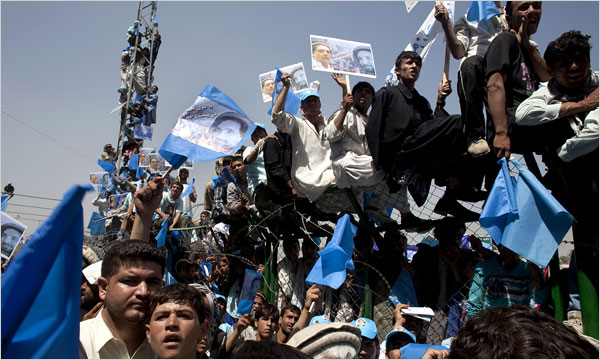
Abdullah Abdullah supporters supporting Abdullah Abdullah
These are trying, heady times in Afghanistan. We are nearly on the eve of the nation’s second presidential election since the overthrow of the Taliban and much is at stake. The Afghan government has ordered a halt to reports of violence, the Taliban have made sure there has been violence to report, and the candidates are finishing up their electioneering. And I’m now gonna talk….geopolitics? I spent a decent amount of time preparing this so I’m still gonna let it fly, or post, whatever. I’ll be back tomorrow and election day with coverage. Until then…
The triangular relationship between the United States-Iran-Afghanistan has been under analyzed for such a strategically important three-way. Afghanistan and Iran are neighbors, each with major security issues, and the United States is obviously strategically and physically involved in Afghanistan and we all know the 30 odd years feud between Iran and the US, with Tehran’s pursuit of nuclear weapons and regional dominance putting further strains on the relationship. These three states’ interests overlap and conflict to varying degrees and they need to be explored.
It is too often assumed that Iran and United States share only congruent interests in the Afghanistan conflict. It is true that Tehran and Washington both desire a stable Afghan state, prevention of the return of the Taliban to power, the elimination of the drug trafficking, and the defeat of Al Qaeda and the two sides have worked together, mainly behind the scenes, toward promoting these goals, but conflicts of interests persist. As much as Iran, and Russia as well for that matter, desires a stable Afghan state, Tehran desperately would like to avoid a Kabul government implicitly or explicitly allied with the United States. Tehran would like a pliable Afghan state that it could exploit and as long as the United States is physically and diplomatically tied to Afghanistan, this cannot happen. Therefore, one should not be surprised to read reports that Iranian elements are aiding certain insurgent groups, including the Taliban, inside of Afghanistan and Pakistan.
US intelligence agencies have officially stated that Iran has ‘covertly supplied arms to Afghan insurgents while publicly posing as supportive of the Afghan government’. The report released by the office of US Director of National Intelligence also stated that ‘Iran’s policy calculation in Afghanistan currently emphasizes lethal support to the Taliban, even though revelation of this activity could threaten its future relationship with the Afghan government and its historic allies within Afghanistan.’ There have been past reports that asserted that the government in Tehran was supplying weapons to certain Afghan insurgent groups as well. We must also remember that this is the intelligence that the US deems releasable and that the real extent of Iran’s activity in Afghanistan is unknown.
The reasons for Iran’s covert help to the Afghan insurgency are no doubt complex and can probably never be fully known, but I feel the main reason has to be the disruption of the solidification of a strong, Pro-American Afghan state. Iran is already hard at work fomenting a Shia-dominated Iraq that will at worst be a non-threat to Iran’s western border and at best a patron and gateway into Middle Eastern dominance. And therefore we should assume they are trying for a similar outcome in Afghanistan, with the gateway toward Central Asia, Pakistan, and China instead of course.
Another factor that needs to be addressed in this geopolitical three-way is the presence of Iran’s nuclear program. For the United States’ Obama administration the Afghan conflict and Iran’s pursuit of nuclear weapons are two of its key foreign policy challenges and surprisingly they are connected in various ways. Scholar Marc Lynch (a big Obama supporter) laments the lack of such strategic analysis and discussion by academics and Obama administration officials on this key intertwining issue. After listening to a presentation by Obama’s Afghanistan policy team, led by envoy Richard Holbrooke, Lynch found much wanting. He raised these ‘crucial strategic’ questions as ones yet to be addressed by the US Afghan team:
How is Holbrooke’s team coordinating with the administration’s Iran policy makers (presumably but not transparently led by Dennis Ross)? How will the administration assess the tradeoffs between pressuring Iran on the nuclear issue and seeking its assistance in Afghanistan, as both issues come to a head over the coming months? Which will give if a choice must be made? Obama’s foreign policy has always been characterized by a strong recognition of the inter-related nature of the various regional challenges — so how do the parts here, in these two vital theaters, fit together?
Great questions for which the answers will be hard to come by; for me and the Obama administration. Nevertheless, these are questions that need to be thought through and answered as quickly as possible. In terms of the question regarding tradeoffs between the American Afghan policy and its pressure on Iran to stop its nuclear weapons’ program, I have to believe the Obama administration will attempt to keep these as separate as possible, and don’t myself see this specific connection having a major impact, that is I don’t see any concessions the US could give to Tehran in terms of its position in Afghanistan that would cause them to give up their pursuit of nukes. Lynch’s last question, regarding the interconnection of various regional challenges with Afghan-Iran-US at the forefront, is the most general, but most needed, as I stated in the beginning, this geopolitical triangular relationship needs more exploration and attention.
(Photo Source: NYTimes)